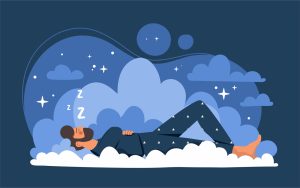Ask Leyla: How do chronotypes factor into ideal bedtimes?

Q: On a recent episode of your podcast, you talked about sleep. You always have great tips—however, you urged people to go to bed at 10 pm.
Dr. Michael Breuss, PHD, is internationally respected as one of the best sleep docs. He has one take a short quiz to determine one’s chronotype in order to determine the best time to go to sleep and wake up. Turns out my best sleep time is determined to be 11:30 pm. If I try to go to sleep more than half an hour before 11:30 pm, my sleep, which is already very disrupted, is worse.
What are your thoughts on this?
A: It’s certainly possible you’re more a night owl and your circadian clock is geared as such. By the way, here’s more info on Dr. Breuss’ chronotypes.
At the end of the day, you have to do what works for you. If you get better more restful sleep going to bed at 11:30 PM, then that should certainly be your bedtime. Another client tells me she gets her best sleep when she goes to bed at midnight, sleeps through the night and wakes at 7 AM.
The same goes for creative folks—musicians and actors. I know some that go to bed at 2 AM and sleep till 10 AM. And it works because their work schedule demands it. Our bodies adjust. Just like readjusting our circadian rhythms to an earlier bedtime.
Remember, whenever your bedtime is, sleep hygiene rules still apply:
Try not to eat too close to bedtime. If your schedule permits, be done eating a minimum of three hours before retiring for the night.
Make sure your bedroom is completely dark when you go to bed. There shouldn’t be any devices blinking at you (i.e., clock radio, computer, etc.) and no light coming through the windows. Get blackout curtains and shades if this is not the case.
One of the worst things to do before going to bed is using your computer or cell phone. Banish these from the night table! The blue light transmitted from these devices inhibit melatonin production. The pineal gland in your brain senses that it’s still “daylight” and won’t secrete the melatonin you need for a good night’s sleep.
Make sure your bedroom is at the optimal temperature for restful sleep. That’s between 60 and 68 degrees Fahrenheit. When we go to sleep at night, our core temperature goes down a couple of degrees. Call it a mini-hibernation that helps us stay asleep. You may not achieve this core temperature if your bedroom is too warm. If your bedroom is cool as a cave and you’re still not able to stay asleep, check out the Intelligent Medicine Sleep Hub for more tips and recommendations on getting a better night’s sleep.
To your health!
Leyla Muedin, MS, RD, CDN